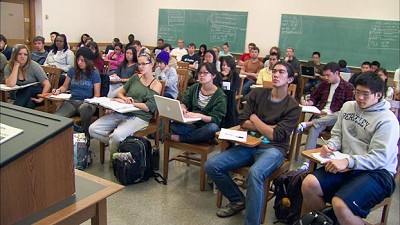Stranger by the Lake (Alain Guiraudie)
I was very impressed by Stranger by the Lake. The mood, the consistency, the commitment is commendable, especially considering how bare (no pun intended) and non-fussy it is. There are limited actors, locations, settings, even shots/frames which are repeated and re-used, but they are so well (and cleverly) constructed that it doesn’t matter and you get something new each time to explore, to decipher, to perceive. A great examination of two basic human instincts of dread and desire and how they overlap and fight with each other, all the time, so closely tied to each other…in humans as well as in the environment. Funny and awkward that Dennis Lim had to (for lack of a better word) warn the audience before the screening that the movie has scenes of an explicitly sexual nature. Good that the director Alain Guiraudie, who came later, helped reduce the unease by saying (I’m paraphrasing): “…hope you enjoy naked men and gay sex!”
At Berkeley (Frederick Wiseman)
 On the other hand, At Berkeley is just mesmerizing, shockingly and surprisingly engaging. It totally took me by surprise how engrossing it was. Over 4.5 hours long, of course I knew that it would be illuminating and unflinching and detailed and democratic, but never this involving and heartfelt. Hardly a redundant shot. Lays bare the difficult situation that UC Berkeley is in of maintaining world-class quality of education while competing with private, loaded institutions like Harvard, Princeton et al., but at the same time, being publicly funded and now facing merciless government cuts. There is every aspect here and everyone, anyone can choose and enjoy and appreciate what they prefer. There is a fascinating physics class on the concept of ‘Time’ and how we perceive it (which goes with the overarching theme of the film itself: how Berkeley of the ’60s and before is remembered compared to the present). Or anything from undergraduate Zoology or interpretative dance, to Leadership or Applied Robotics, to faculty voting on subsidized day-care for young teachers, or the janitorial staff and their daily grind, or issues of diversity where Blacks and Asian students have their own, but diagrammatically opposite, racial issues. There are the fly-on-the-wall extended scenes of budget meetings (how much faculty is separated from operations and administration was eye-opening), or the town shops and neighborhood of Berkeley, or a beautiful poetry reading of E.E. Cummings’ “anyone lived in a pretty how town,” or the new unease of the ‘white middle-class poor.’
On the other hand, At Berkeley is just mesmerizing, shockingly and surprisingly engaging. It totally took me by surprise how engrossing it was. Over 4.5 hours long, of course I knew that it would be illuminating and unflinching and detailed and democratic, but never this involving and heartfelt. Hardly a redundant shot. Lays bare the difficult situation that UC Berkeley is in of maintaining world-class quality of education while competing with private, loaded institutions like Harvard, Princeton et al., but at the same time, being publicly funded and now facing merciless government cuts. There is every aspect here and everyone, anyone can choose and enjoy and appreciate what they prefer. There is a fascinating physics class on the concept of ‘Time’ and how we perceive it (which goes with the overarching theme of the film itself: how Berkeley of the ’60s and before is remembered compared to the present). Or anything from undergraduate Zoology or interpretative dance, to Leadership or Applied Robotics, to faculty voting on subsidized day-care for young teachers, or the janitorial staff and their daily grind, or issues of diversity where Blacks and Asian students have their own, but diagrammatically opposite, racial issues. There are the fly-on-the-wall extended scenes of budget meetings (how much faculty is separated from operations and administration was eye-opening), or the town shops and neighborhood of Berkeley, or a beautiful poetry reading of E.E. Cummings’ “anyone lived in a pretty how town,” or the new unease of the ‘white middle-class poor.’
And then, of course, towards the end is a student protest against the monetization of education, the sort of climactic moment that you get in a Frederick Wiseman documentary. In fact, one of the interesting things I noticed was that by the end, one wonders if Wiseman is taking the side of the administration (who are, especially now ex-president Birgeneau, presented in a sympathetic light) and the faculty, more than the students, especially considering how the protests were handled. Or perhaps experience over youth? Or perhaps youth of ‘today’? But all of this and more is only for us to judge. There is not a single voice-over or subtitle/inter-title anywhere.
